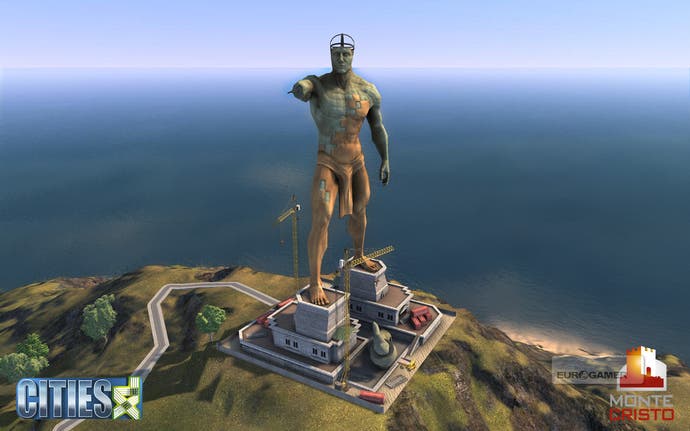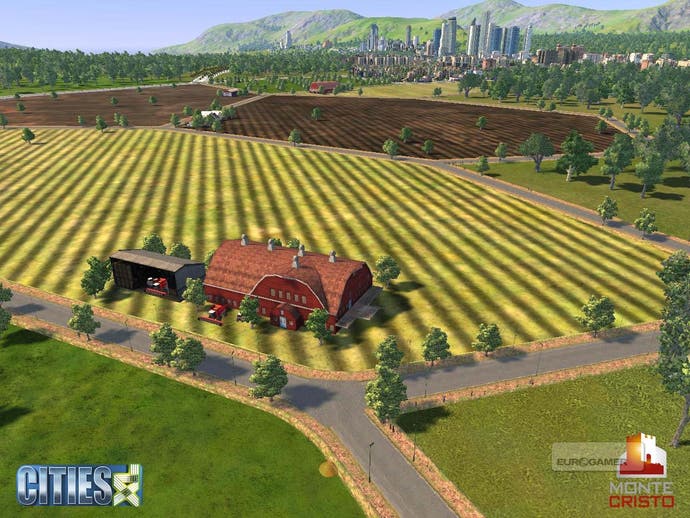Cities XL
Edifice complex.
From an hour-long preview it seems clear that, beneath the graphical polish and clever interface, the important stuff - the economic heart of the game - is pumping nicely, with the population reacting believably to whatever you build. Farms and factories bring workers in droves, but a lack of amenities means they'll quickly start to get tetchy, and, true to form, nobody really wants to have a nuclear power plant visible from their sun room.
Crucially, Cities XL is already capable of providing that handful of magical moments that only strategy sims can: moments when building a factory in an empty district riddled with unemployment leads to a sudden burst of house-building activity as a new population floods in, or when a spin of the mouse wheel smoothly whisks you from a close-up view of the paving stones you've been laying down, to a satellite map which shows just how much the metropolis you've pieced together has started to thrive, or begun to wither.
That's where you could leave things, of course, but, for an optional fee - likely to be somewhere around the five Euros per month region - you can take the game online.
XL's shards are based on the same globe as the single-player game, each planet providing space for several thousand players. After designing your own mayor avatar - more Second Life than City of Heroes - it's a race to choose the best plot of land before somebody else does, and then construction begins afresh.
And it will be afresh. In order to level the playing field for everyone, you can't build a city in the single-player game and import it, fully-formed, online. But you probably wouldn't want to, either, as XL's focus on co-operation means you'll need to know what your neighbours are up to before you can tell what kind of environment to construct yourself.
Co-operation hangs on resource-trading, which can be performed either in-game or through the website. Every day, your city will create a number of resources, based on the terrain type it sits on, and the kind of buildings you've constructed. This ensures that, no matter how balanced you are in your zoning, you'll inevitably lack some of the things your population needs to survive: you may be good at mining raw materials, for example, but weak with sewage processing, so you'll need to import clean water from a neighbour.

This is achieved through the trading menu - a search screen which allows you to see which resources other cities on your shard are over-producing, and then gives you the opportunity to propose a swap. As with the construction side of the game, the screen's a simple drag and drop interface which allows you to select what you want to import, and what you're willing to export in return, and a quick turnaround means it's likely to lead to protracted haggling as each party strives for the best offer.
Adding an extra urgency to trades are the game's megastructures - iconic real-world landmarks such as New York's Chrysler Building, Rio's Christ, or the delightful multi-level WH Smiths at Victoria Station (one of these is not actually in the game) which you can only construct if you win the right blueprint in the weekly online lottery. Once a blueprint's been activated, you have a week to build it: a multi-stage process, each part of which requires a certain combination of resources. With twenty megastructures planned for launch, and an additional five released every month, they're pure architectural Pokémon, the dash to complete them before the time runs out adding a welcome scramble to the slow-ticking persistence of the rest of the game.
Although the company is new to MMOs, Monte Cristo has spent a lot of time creating checks and balances to ensure no-one exploits the system and ruins the careful economy of the game. Unused resources will disappear after twenty-four hours if they haven't been traded, and megastructure blueprints will vanish after a week if they haven't been built or swapped. It's a move which should make long-term gold-farming impossible, while also encouraging the community to trade a little every day. The only cause for concern is the way trading itself is handled - a bartering system which inevitably requires both parties to agree. That's a potential problem, given the migratory communities of many MMOs, where players often lose interest after a few months and forget to log in again, while their cities quietly continue to pump out resources other players need, but can't get.

Such worries aside, Monte Cristo has already realised that people aren't going to play this the way they play World of Warcraft: they won't be getting together with a clan for all-night shopping centre construction sprees, or turning up for work bleary-eyed and unshaven having spent the weekend nailing the finer points of their sewage systems. Most players will likely put a lot of work in at the early stages, and then retreat to a more measured pace of daily management - and with the necessary tools available both in-game and on the website, XL seems well-placed to cater for this kind of activity.
So while Blizzard is hardly getting nervous as Cities XL's second-quarter release approaches, those looking for something different in an MMO - a bonsai garden to maintain rather than a rugged wilderness to conquer - may find Monte Cristo's polished oddity exerting a gentle fascination. A game about sharing rather than grinding, about balancing needs rather than collecting pelts, this is a utopian dream slotted in amongst the more familiar range of day-glo nightmares.








